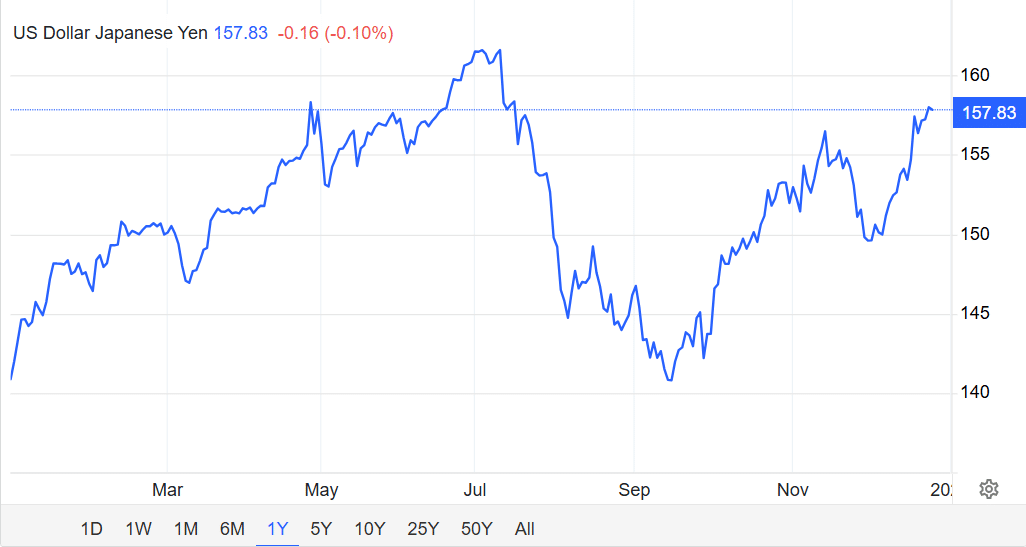- Bitcoin reserves have sparked intense controversy, with countries deeply divided over their potential.
- As Japan faces mounting economic pressures, could Japan be the perfect case study?
The Bitcoin debate [BTC] reserves divide the market. Some see it as a crucial hedge against dollar volatility, while others remain extremely cautious, concerned about the speculative risks involved.
The divide is so sharp that even the Fed and the Trump administration are at odds, each taking a starkly different position on the issue.
Now Japan is joining the conversation and raising it to assure about the potential risks of including Bitcoin in its foreign reserves.
But here’s the catch: the Japanese yen has hit a five-month low against the US dollar, joining a growing list of G20 currencies struggling to keep up with the dollar’s dominance .
So will Japan’s cautious approach to Bitcoin reserves be seen as a missed opportunity? Or will this economic pressure push Japan – and other countries – to finally recognize BTC as a serious alternative?
Unraveling Japan’s economic storm in 2025
The recent FOMC rate cut caused a ripple effect on the markets, leading to an ‘unexpected’ turn.
On December 18, as the Fed’s decision made headlines, the US dollar rose index rose to a staggering two-year high of 108.54.
The consequences were swift and brutal. Bitcoin fell 14% in just three days as global currencies crumbled under the pressure. The Japanese yen was not spared, falling to a five-month low of 158 per dollar.


Source: Trade Economics
In immediate response, the Bank of Japan (BOJ) stood firm and kept interest rates stable. But the real storm may be in sight.
The long-term impact of a rising dollar could be far-reaching, with inflationary pressures expected to increase.
The signs are already there. Japanese annual inflation rate spiked to 2.9% in November 2024, up from 2.3% the month before, marking the highest reading since October 2023 – and it’s more than just a number on a chart.
This wave of inflation is a clear signal of things to come. Rising inflation, combined with the strong dollar, puts Japan in a difficult situation. Imports are becoming more expensive, putting pressure on both companies and consumers.
All this takes place against the backdrop of Japan’s demographic crisis – an aging population and falling birth rates.
This shift weakens the workforce, exacerbating the challenges of 2025.
So are Bitcoin reserves the right solution?
The answer is not unequivocal: it is both a ‘yes’ and a ‘no’. On the one hand, Bitcoin’s limited supply makes it a strong hedge against rising inflation.
Unlike the US dollar, which can be printed at will, Bitcoin’s limited supply provides Japan and other economies with protection against currency devaluation.
However, there is a significant disadvantage. Bitcoin’s price can be very volatile, making it a risky asset for a country like Japan that values stability above all else.
That said, with Japan’s economy under increasing pressure, the idea of embracing Bitcoin reserves may not be as far-fetched as it once seemed. In fact, it could soon become a necessity for economic resilience.
And this shift is not just about national economies. On a smaller scale, major exchanges also stack Bitcoin. For example, Bitcoin from Bitfinex to book recently reached more than $230 million, a level last seen three years ago.
As more countries see Bitcoin as a ‘safety net’ against the growing volatility of global markets, high liquidity is expected to flood the market, with exchanges preparing for increased demand.
Read Bitcoin’s [BTC] Price forecast 2025-26
As the US dollar continues to dominate, many economies are looking for alternatives. Bitcoin could be the answer, but only if the price stabilizes over the next year.
If so, the possibility of using Bitcoin as a hedge and even as a means of payment may no longer be a distant dream.

